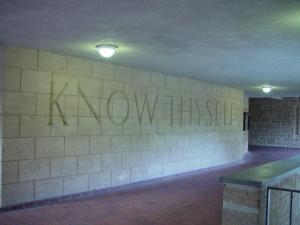 Know thyself. This philosophical wisdom, declared by the Oracle at Delphi and continued by Socrates in his promotion of living the examined life remains one of the key disciplines which we should all engage if we want to know God. For when we truly come to know ourselves, we come to know God, as St. Antony the Great told his followers:
Know thyself. This philosophical wisdom, declared by the Oracle at Delphi and continued by Socrates in his promotion of living the examined life remains one of the key disciplines which we should all engage if we want to know God. For when we truly come to know ourselves, we come to know God, as St. Antony the Great told his followers:
The rational man who has prepared himself to be set free through the advent of Jesus, knows himself in his intellectual substance. For he who knows himself knows the dispensations of the Creator and all that He does in His creatures.[1]
If we want to know God, we must look within. We are created in the image and likeness of God. By knowing ourselves, we see the image and likeness of God, and are able to transpose ourselves from the type to the prototype. This, of course, is easier said than done. We can explore ourselves in very shallow ways, and in doing so, receive a shallow understanding of God. Only when we realize we are a mystery to ourselves do we truly begin to explore who we are and find ourselves, in kind, able to explore the mystery of God.
This should not be surprising. God knows all things in and through knowing himself. He knows them because he establishes them in his simple, immutable, eternal activity. In knowing himself, he knows who he is and what he does. He knows all things because they come from him in his creative activities. God knows his divine energies because they come from himself. More than anyone else, God is not ignorant of himself. He truly knows all that there is to know of himself. There is nothing which he is ignorant of because he knows himself. All things come from him, so he knows all things. There is nothing which exists which he did not established, and so there is nothing which he does not know. He knows them, even as he knows all things which could be, all the potentialities which exist in and through being, as he established being itself and all its possible gradations. He knows all things in and through himself, and so he needs nothing other than himself to know them.
It should not be a surprise, then, if we are in the image and likeness of God, we can come to know all things through ourselves. Nonetheless, we must recognize there is a difference between the way we can be said to know all things through ourselves and how God knows all things through himself. God knows in a transcendent fashion, in a way which can be said to be beyond what we mean or understanding when we talk about how we know things. He knows all things in an absolute fashion as he knows all things in himself. We know all things in a derivative manner. We come to reflect upon ourselves, to know ourselves, and in so doing, realize our relationship with God. We come to know the kingdom of God within us. Slowly, through much discernment, we come to know God as he is found within us. We see him working with us, interacting with us, engaging us in that presence. Through this knowledge, we begin to see and know God and how he acts. We begin to see the dispensations of God, and through such knowledge, we begin to understand how he works not only in us but outside of us as well. As God’s activity is infinite and relates to the production of all things, as we get to know God and how he acts, in and through our knowledge of God, we then can be said to know all things. We don’t comprehend God, and for this reason, knowing all things must not be confused with comprehending all things. We do not comprehend them, but we know them; with a proper engagement with God, we can see all things as if looking into a mirror. The clearer our understanding, the clearer our vision, the clearer the mirror, and the better the reflection and discernment we have with all things.
And, to continue our differences from God, it must be acknowledged that we engage the world around us and come to understand it through our senses. While we can come to know the world through God, we also come to know it in and through living within it. There is no conflict between the two. They not only confirm each other, they complement each, giving different glimpses and ways of understanding the world. The world is real. It is not just some mere spiritual principle which we engage merely in the realm of ideas. We sense it. We observe it. We learn from it. As we begin to understand the world, we should be able to see how our sensual understanding of the world is reinforced and complemented by our vision of God within ourselves.
This knowledge we receive through the vision of God within us is not meant to lead to some sort of Gnostic quietism which rejects the world. This is why it is important to realize the kingdom of God, the presence of God, is found not only within ourselves but within the world at large. We are called to know God in all things, through all things, as he is the source and foundation of all things. We are to engage him, and we engage him not only by thinking about him, but by acting upon what we have come to know and learned. Knowing and doing in God are one and the same for God; therefore, reflecting God, we are turn our knowledge into action and our action into knowledge. As long as we do not do that, we do not properly know ourselves, and so we do not know God.
It is important, therefore, to reinforce the point that the world comes out of God, is a work of God, and so reflects God. This is another reason why we should know the world outside of ourselves. God, being transcendently great and incomprehensible, is able to be discerned through multiple angles, each one giving us new insight and awareness, new knowledge, of him. We should look out to the world and see its beauty. We should explore being in and through the world, exploring the complex chain of causalities which lie behind the world. Sometimes, it can be easier for us to do this than coming to know ourselves. We tend to lie to ourselves about ourselves, covering up and hiding the secrets which we do not wish to know. To know ourselves requires honesty about ourselves, a willingness to look closely at ourselves and accept what we find however difficult it is. This can be a great challenge, as we must slowly peel away all the veils which we have made to hide ourselves from the truth; if we cannot yet do it, then coming to know God through the world is the way to go, but this does not mean it comes without challenges and possibilities for error because: relying upon our senses for what lies beyond ourselves means we rely on imperfect instruments with severe limitations on what they can observe even when they work properly.
We can come to know God through ourselves. We can know God through the world. The two are interrelated and interdependent ways of coming to know God. The one does not contradict the other. They reveal God in their own particular way. When we come to know God through one, we learn about the other. But with the great diversity which lies outside of us, which we cannot sense or discern, coming to know God from knowing the world is a much more difficult endeavor. For this reason, once we are willing to be honest with ourselves, we have a better focal point to come to know God with ourselves. We do not have to go in an infinite variety of places to discern different, smaller elements of God’s work. We have everything within. This is why the focus of knowing ourselves serves us best in coming to know God, because it is the quickest, most direct route we have to God, making the words of the oracles and sages in the past to continue to be words of wisdom which are worthy of us to follow today.
[IMG=Lettering of Know Thyself [Public Domain] via pixnio]
[1]St. Antony the Great, The Letters of Saint Antony the Great. Trans. Derwas J. Chitty (Fairacres, Oxford: SLG Press, 1991), 9 [Letter III].
Stay in touch! Like A Little Bit of Nothing on Facebook













